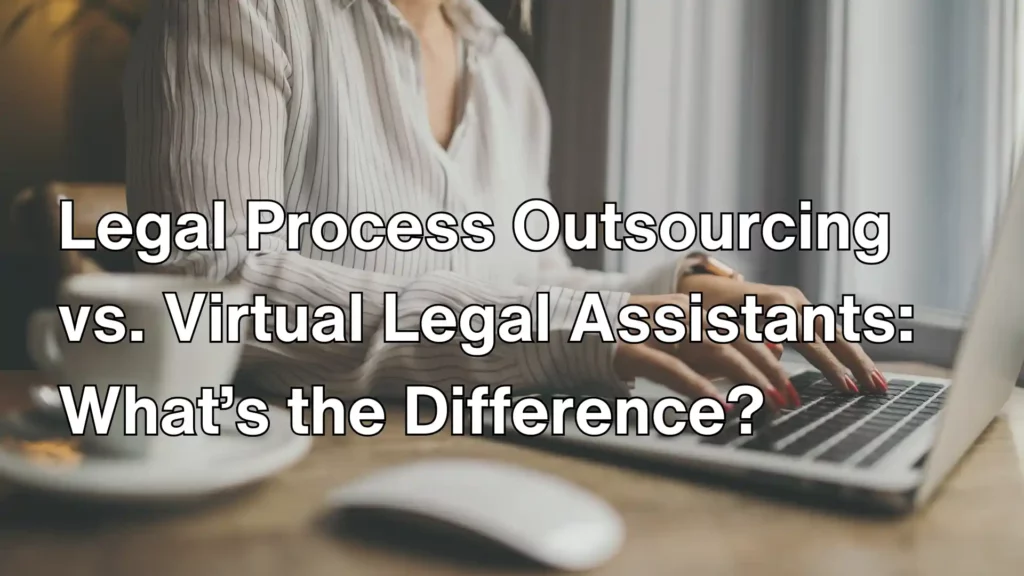We equip you with outsourcing solutions distinctly designed for your business and your customers’ needs.

Law firms and corporate legal departments often look for cost-effective and efficient ways to manage workloads. Two of the most popular solutions are legal process outsourcing (LPO) and virtual legal assistants (VLAs).
While these terms may sound similar, they refer to two distinct types of legal support, and which is best for you depends on your particular needs. Understanding the differences between LPO vs. virtual legal assistants is essential for law firms and departments seeking to optimize their processes and reduce overhead costs.
Legal process outsourcing is the practice of delegating legal services to an external service provider. When the service provider is located in the same country, this process is known as onshoring, and when they’re located in a different country, it’s known as offshoring. Offshoring can often be a more cost-effective solution.
These third-party providers can assist with various legal tasks and offer scalability that hiring in-house employees cannot. Rather than needing to go through a hiring process for each member of an internal legal team, LPO employees are already vetted by the outsourcing company and can be assigned to help with your business as needed.
Some of the most common services provided by LPO include:
Virtual legal assistants are individuals who provide remote legal and administrative support for small law firms, legal departments, and solo practitioners. They’re often freelancers who work with a single client on an ongoing basis, allowing them to provide more personalized legal support. While LPO offers a team of paralegals to help with large volumes of work, VLAs act more like regular remote employees.
Some of the most common services provided by VLAs include:
Before choosing between LPO and VLAs, it’s essential to understand their key differences and your specific needs. Depending on your situation, one option may be better than the other. The differences between these services can be broken down into categories such as scope, provider type, location, contract, personalization, cost, and best use cases.
Scope is one of the most significant differences between these types of legal outsourcing. LPO is often used for large-scale legal tasks and support functions. For example, if your firm handles many cases at once and there’s a lot of paperwork to review, LPO can shift the burden off of your in-house staff. On the other hand, law firms often use VLAs when they have a diverse set of smaller tasks that a single person can handle.
LPO is usually performed by companies with large numbers of staff or outsourcing firms that connect law firms with the support staff they need. In contrast, VLAs are typically individual legal professionals or freelancers. Outsourcing companies can also help connect law firms with VLAs if necessary.
LPO typically involves offshore teams, while VLAs can be local, onshore, or offshore. One of the primary considerations regarding the location of your legal support is availability. Even when they’re in a different timezone, LPO employees may work on your time. This flexibility may be less likely with a VLA.
LPO is frequently used for either specific projects or long-term bulk services. For example, if your firm has a large case and needs extra hands or if you have a constant stream of paperwork to deal with, LPO can help alleviate the stress. VLAs work more like traditional independent contractors and may be hourly, part-time, or retainer-based employees.
LPO’s personalization is often limited, as it’s primarily focused on improving efficiency in high-volume tasks. VLAs have high personalization, as their role can be tailored to an attorney’s or firm’s specific needs. Finding the right balance between bulk and personalized work is key.
LPO costs are usually significantly lower than hiring in-house staff to perform the same legal work. It’s also often lower than hiring a VLA, particularly if the team performing the work is offshore. VLAs are usually cheaper than hiring in-house staff because they are remote. However, they are usually more expensive than LPO, which involves a large team at a relatively low rate.
The best use cases for LPO are large firms and corporate legal departments that handle high volumes of cases and paperwork. Meanwhile, the best use cases for VLAs are small law firms and solo practitioners who need an extra set of hands to complete their casework.
 When choosing between LPO and hiring a VLA, the first step is to look at the type of work you need help with. Do you have a large number of repetitive legal tasks, like document reviews? Or are the tasks you need assistance with more varied? If you have bulk tasks, LPO will likely be the right solution, and a VLA may be better if you have more specialized tasks.
When choosing between LPO and hiring a VLA, the first step is to look at the type of work you need help with. Do you have a large number of repetitive legal tasks, like document reviews? Or are the tasks you need assistance with more varied? If you have bulk tasks, LPO will likely be the right solution, and a VLA may be better if you have more specialized tasks.
The next step is to consider the type of working relationship you want with the person or entity you’re outsourcing work to. With a VLA, you get a more personalized experience that is closer to having a regular employee. When using LPO, you may have less interaction with the people directly performing the work.
Finally, it’s important to consider your budget. LPO will typically be less expensive for the work you’re getting.
If you need outsourced legal help, contact Peak Outsourcing to speak to a member of our team and learn how we can help streamline your legal processes with legal process outsourcing or virtual legal assistants. No matter the size of your current team, we can help your legal business grow in a cost-efficient manner.
Your company may benefit from outsourcing certain functionality that you currently perform in-house. The resulting benefits can transform the way you do business and provide a greater focus on your core business functions.
Submit a contact form or call Peak Outsourcing today at